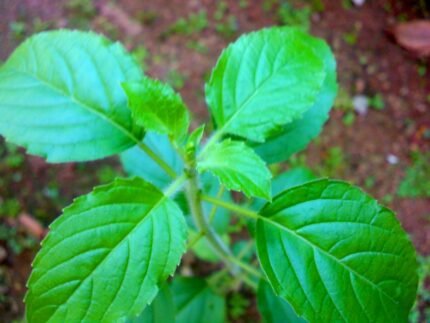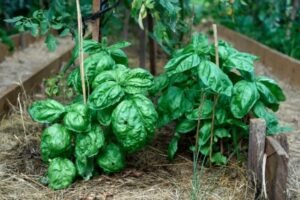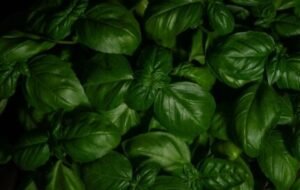Medically reviewed by Dr. Ramesh Gaddam, M.D. — Written by Sumalatha, D.N.H.E
1. Nutrition of Basil Leaves
Nutrition of Tulsi leaves per 100 grams:
| Nutrient | Amount |
|---|---|
| Calories | 23 kcal |
| Protein | 3.15 g |
| Carbohydrates | 2.65 g |
| Dietary Fiber | 1.6 g |
| Sugars | 0.3 g |
| Fat | 0.64 g |
| Vitamin A | 527 IU |
| Vitamin C | 18 mg |
| Calcium | 177 mg |
| Iron | 3.17 mg |
| Magnesium | 64 mg |
| Potassium | 295 mg |
2. Basil Leaves Benefits
Supports Immune Health
Basil leaves are rich in vitamins like Vitamin C and A, which are important for maintaining a strong immune system.
The antioxidants in basil help protect cells from damage and support overall immune function. Consuming basil can help your body fight off infections and illnesses more effectively.
Reduces Stress
Tulsi, or Holy Basil, has adaptogenic properties that help the body cope with stress. It may help regulate stress hormones and promote a sense of calm.
Regular use of Tulsi can support mental balance and help manage the effects of daily stress.
Anti-Inflammatory
Basil leaves contain compounds that may reduce inflammation in the body. Chronic inflammation is linked to various health issues, so consuming basil can help alleviate inflammation-related symptoms.
This makes basil beneficial for overall joint and muscle health.
Improves Digestion
Basil leaves can aid in digestion by promoting the production of digestive enzymes. They may help relieve symptoms like bloating and gas. Including basil in your diet can support a healthy digestive system and improve overall gut health.
Promotes Healthy Skin
The antioxidants in basil leaves, such as Vitamin A and C, help protect the skin from damage caused by free radicals.
These nutrients can support skin repair and maintenance, leading to a healthier, more youthful appearance. Basil also has anti-inflammatory properties that can benefit the skin.
Supports Respiratory Health
Basil leaves can act as a natural expectorant, helping to clear mucus from the respiratory tract.
They may provide relief from coughs and other respiratory issues. Incorporating basil into your diet can support respiratory health and help you breathe more easily.
3. What’s Inside Basil (Tulsi) Leaves?
Tulsi leaves are packed with various nutrients that support your health:
Vitamins:
Tulsi leaves are rich in vitamins A and C. These vitamins help maintain healthy skin and support your immune system, keeping you protected from illnesses.
Minerals:
They contain essential minerals like calcium, iron, and magnesium. These minerals are important for building strong bones and teeth, and they support overall bodily functions.
Antioxidants:
Tulsi leaves are loaded with antioxidants that protect your cells from damage caused by free radicals. This can help reduce the risk of chronic diseases and support overall health.
Phytochemicals:
Tulsi leaves have unique compounds that may help lower stress and improve mood. These natural chemicals can act as mood enhancers and support mental well-being.
Essential Oils:
The leaves contain essential oils such as eugenol and caryophyllene, which have anti-inflammatory and antimicrobial properties. These oils contribute to reducing inflammation and fighting off infections.
Dietary Fiber:
Tulsi leaves are a good source of dietary fiber, which aids in digestion and helps maintain healthy cholesterol levels.
4. How to Include Basil Leaves in Your Life?
Brew Tulsi leaves into a soothing herbal tea. It’s a great way to enjoy the benefits of Tulsi and relax after a long day. Just steep a few fresh or dried leaves in hot water for a few minutes.
Add fresh Tulsi leaves to salads, soups, or smoothies. Their aromatic flavor can enhance the taste of your dishes while providing extra nutrients.
Use dried Tulsi leaves as a spice in your cooking. They can be added to curries, stews, or sauces for a unique flavor and additional health benefits.
Consider Tulsi supplements if you’re looking for a more concentrated dose. They come in various forms, such as capsules, tablets, or extracts, and can be easily included in your daily routine.
Tulsi can be used in skincare routines as well. Look for creams or masks containing Tulsi extract, or make a DIY face mask with Tulsi leaves to take advantage of its skin-soothing properties.
5. Traditional and Ayurvedic Uses of Basil
Tulsi, also known as holy basil, holds a special place in Ayurveda, the ancient Indian system of medicine. Ayurvedic principles consider Tulsi as a potent herb with various therapeutic properties.
It’s believed to balance the doshas (Vata, Pitta, and Kapha) and is commonly used to address a range of health issues, including respiratory conditions, stress management, and promoting overall well-being.
Tulsi has been used in traditional remedies and practices for generations. It’s an integral part of Indian households, often used in teas, tonics, and home remedies for colds, coughs, and various ailments.
Additionally, Tulsi is used in religious and spiritual practices and is considered sacred in Hinduism.
6. Skin and Hair Care with Tulsi Leaves
Tulsi leaves, or holy basil, can be used to create DIY skincare products like face masks, toners, and moisturizers.
Its natural antibacterial and antioxidant properties make it a great ingredient for promoting healthy and radiant skin.
Tulsi leaves are beneficial for hair care. They can be used to make hair masks, rinses, and oils that help improve hair quality, stimulate hair growth, and maintain a healthy scalp.
7. Managing Stress and Anxiety with Tulsi Leaves
8. Precautions and Possible Side Effects
9. Interaction with Other Drugs
11. Buying, Growing, and Storing Basil
Buying: When buying basil, look for vibrant green leaves that are fresh and free from wilting or brown spots. Choose basil with a strong, aromatic scent, as this indicates freshness and flavor. You can find basil at most grocery stores or farmers’ markets.
Growing: Basil thrives in warm, sunny environments. Plant it in well-drained soil with plenty of sunlight. You can start basil from seeds or buy young plants. Water regularly but avoid overwatering, and pinch off the tops of the plants to encourage bushier growth. Basil can be grown in pots or directly in the garden.
Storing: To keep basil fresh, store it in the refrigerator wrapped in a damp paper towel or in a sealed container. For longer storage, you can freeze basil leaves in an airtight bag or freeze them in ice cube trays with a bit of water or olive oil. Dried basil can be stored in an airtight container in a cool, dark place.
12. Culinary Uses
Basil is a versatile herb used in various cuisines:
- Sweet Basil: Often used in Italian dishes like pesto, pasta sauces, and caprese salads. It adds a fresh, slightly sweet flavor to dishes.
- Thai Basil: Essential in Thai and Vietnamese dishes, such as stir-fries and curries. Its spicy and anise-like flavor complements savory dishes.
- Purple Basil: Adds a unique color and a mildly spicy flavor to salads, garnishes, and sauces. It’s also used for its striking appearance in dishes.
- Lemon Basil: Used to add a citrusy note to dishes, such as in seafood, chicken, or salads. It’s great for recipes where a hint of lemon is desired.
- Holy Basil (Tulsi): While less common in everyday cooking, it’s used in herbal teas and traditional dishes for its distinctive flavor and health benefits.
Each variety can enhance different recipes, adding fresh and unique flavors to your meals.
13. Tips for Use
- Add Fresh at the End: To preserve basil’s flavor and aroma, add fresh basil leaves at the end of cooking, just before serving.
- Use in Pesto: Basil is a key ingredient in pesto. Blend fresh basil with garlic, pine nuts, Parmesan cheese, and olive oil for a delicious sauce.
- Combine with Tomatoes: Basil pairs perfectly with tomatoes. Use it in salads, sauces, and soups for a classic flavor combination.
- Make Basil Infused Oil: Blend basil with olive oil and strain it to create a flavorful basil-infused oil, great for drizzling over dishes.
- Use as a Garnish: Fresh basil makes an attractive and flavorful garnish for dishes like pasta, pizza, and soups.
- Try Different Varieties: Experiment with different basil varieties, like Thai or lemon basil, to add unique flavors to your recipes.
Conclusion
Holy Basil, or Tulsi, is a remarkable herb known for its wide range of health benefits. It supports the immune system, helps manage stress, and promotes overall mental well-being due to its adaptogenic properties.
Its antioxidant and anti-inflammatory effects can aid in reducing inflammation and protecting against cell damage. Additionally, Holy Basil can support digestive health and improve skin health.
Regular use of Tulsi, whether in tea or supplements, can contribute to a balanced and healthy lifestyle, making it a valuable addition to daily health routines.
Frequently Asked Questions (FAQs)
What Are Basil Leaves Good For?
Basil leaves are good for enhancing flavor in dishes and providing various health benefits.
They contain vitamins and antioxidants that support immune health, reduce inflammation, and aid digestion. Basil leaves also have antibacterial properties and can help improve skin health.
Can You Eat Basil Leaves Every Day?
Yes, you can eat basil leaves every day. Including basil in your diet can be beneficial due to its nutrients and antioxidants.
Just be mindful of variety and balance in your diet to ensure overall nutritional needs are met.
Is It OK to Eat Raw Basil Leaves?
Yes, it’s perfectly fine to eat raw basil leaves. They can be added to salads, sandwiches, or smoothies to enjoy their fresh flavor and health benefits.
Raw basil also retains more of its natural oils and nutrients.
Can I Boil Basil Leaves and Drink?
Yes, you can boil basil leaves and drink them as a tea.
Boiling basil leaves releases their beneficial compounds into the water, creating a soothing herbal tea that can help with digestion and relaxation.
Is It Good to Drink Basil Water Every Day?
Drinking basil water every day can be beneficial due to its antioxidants and vitamins.
It may help with hydration, digestion, and overall health. However, it’s best to consume it in moderation and as part of a balanced diet.
Are Tulsi and Basil the Same?
Tulsi and basil are related but not the same. Tulsi, also known as Holy Basil, is a specific type of basil with unique health benefits, especially for stress and immune support.
Regular basil, often used in cooking, has a different flavor and set of benefits.
What Happens If We Eat Tulsi Leaves Daily?
Eating Tulsi leaves daily can offer benefits like reduced stress, improved digestion, and enhanced immune function.
It may also help with inflammation and support overall health. However, it’s important to consult a healthcare provider if you have any specific health conditions.
Is It Safe to Drink Tulsi Tea Every Day?
Yes, it is generally safe to drink Tulsi tea every day for most people. Tulsi tea can help manage stress, support immunity, and improve digestion.
If you have health concerns or are on medication, consult with a healthcare provider to ensure it’s suitable for your needs.
References:
[1] https://www.webmd.com/diet/health-benefits-basil
[2] https://www.medicalnewstoday.com/articles/266425
[3] https://www.healthline.com/nutrition/basil
[4] https://www.researchgate.net/publication/324085682_Basil_A_Brief_Summary_of_Potential_Health_Benefits
[5] https://www.healthline.com/nutrition/basil-seeds
Also Read:
Arugula: 7 Amazing Health Benefits (Heart, Skin, and More)
9 Great Benefits of Asparagus for Men, Women, Skin & More
Top 7 Health Benefits of Green Apple (You Need to Know)
Medically reviewed by Dr. Ramesh Gaddam, M.D.

General Physician, Diabetologist, and Critical Care Specialist.
Discover more from Health Build-Up
Subscribe to get the latest posts sent to your email.



1 thought on “Basil (Tulsi) Leaves: Nutrition, Side Effects (12 Benefits)”
Comments are closed.